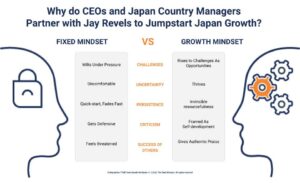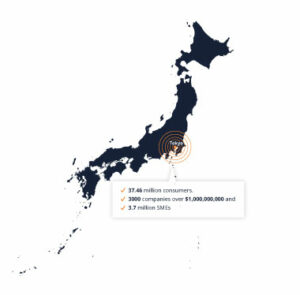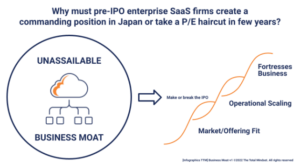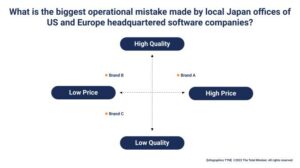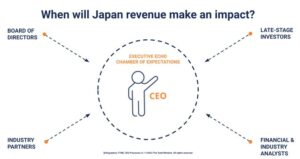
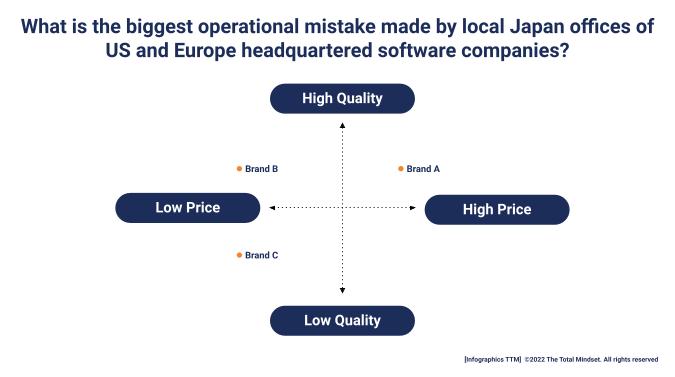
What is the biggest operational mistake made by local Japan offices of US and Europe headquartered software companies?
The process of positioning sets your business apart from your competitors.
Your competitive positioning builds a favorable preference in the minds of your target market and ideal customers.
All too often an international software company opens an office in Japan with the goal of growing a base of profitable customers.
They start with their marketing materials and presentations, developed in Western markets, translating this content for local use.
Months later, the company still struggles with getting significant traction: few if any lighthouse accounts, recurring revenues, and customer testimonials.
What happened?
The principals of The Total Mindset have learned this the hard way: months of trial and error, minor sales wins, and lots of frustration.
We submit that the successful international software company must first research, craft and drive a competitive positioning of its flagship product, and the 10x value-feature of the product that earns you the right to win eight times out of 10.
Sluggish revenues often result from a vague and off-point competitive positioning in the minds of your ideal customers.
So let’s look at the upstream inputs that create sluggish revenues and a suboptimal competitive positioning.
- Simplistic translations: Brands tell stories that introduce a product and reassures customers. The hard work of narrative design is strong visual explanations and vivid metaphors: Wheelbarrows full of “fertilizer” won;t make deserts bloom.
- No local use-cases: Global successes and case studies do not resonate with Japan prospects.
- Weak or non-existent solution prototyping: International firms must first earn the right to sell their products. Often this requires an initial focus on rapid ideation of localized functional prototypes and service-heavy solutions.
- Targeting known, solved problems: International software companies must first solve those hard problems that bedevil competitors and frustrate customers. Solving these hard problems shines a bright and warm light on your value proposition and why to buy from you.
- Always be selling: Instead of researching individual accounts and tailoring a value proposition to their stated and inferred needs, many software companies believe in spray-and-pray lead activations and hardcore get your foot in the door tactics.
- Launch wide-spectrum marketing campaigns. Instead of focusing on one or two high-value, hard-to-deliver use cases, international software companies use lofty images, tarted-up collaterals and blah-blah sales presentations. They throw great parties, sponsor splashy events, and dump a ton of money in advertising and direct mail campaigns.
- Weak local sales leadership: This often results from hiring an English-fluent B-level player instead of a high-impact sales leader with moderate English proficiency.
At The Total Mindset, we believe that it is important to first get your competitive positioning right.
We start with a thorough understanding of the business ecosystem of competitors, solution providers and related business and technical services.
We follow with a hard-fact analysis of customer requirements, the jobs to be done by your product, and the inferred expectations of customers for their chosen technology partners.
A feature-by-feature comparison of competitors and product attributes will speed the identification of the 4% of the functions that nonetheless deliver 64% of your product’s total customer value.
With these building blocks, we speed the development composite use-cases with prospective customers and partners. We take great care in shaping use-case narratives that will translate well into Japan market.
Unlike traditional agencies and go-to-market advisers, TTM facilitates the rapid ideation of functional prototypes in value-studio workshops with potential customers and partners.
Strategic Positioning
When software companies decide to enter Japan, they have product market fit in their home markets.
Often they have expanded product portfolios beyond the product with which they launched their business and achieved scalable success … that took years and thousands of market and customer inputs.
Establishing a strong competitive positioning in Japan takes time, investment, expertise and a few lucky breaks.
Many international technology companies realize that it took more than a copy-and-paste replication of what already worked in their home markets.
Earning a favorable preference in the minds of your ideal customers starts with a deliberate focus to create a strong value proposition, that when realized becomes the foundation for a competitive positioning.
Said another way, marketing does not create a competitive positioning. Successful customers do.
In the process, you must account for limited resources and low brand credibility inherent in entering Japan.
Too many new offices omit critical steps for delivering a value proposition and ensuring the customers get full value for their investment of money, resources and foregone opportunities.
About
Jay Revels
...more to come
Jay Revels, CEO, The Total Mindset
The Total Mindset
The Total Mindset (TTM) is a growth accelerator for small to midsize digital enterprises based in N. America, Europe and Australia with the strategic goal of starting or growing their Japanese businesses.
TTM partners with the CEO of infotech providers of software or digital services to Japanese business customers.
Unlike traditional advisory firms, TTM provides ready-to-operationalize Nemawashi growth playbooks, co-sources talent and partners, and co-supervises execution and weekly pipeline and operational reviews.



